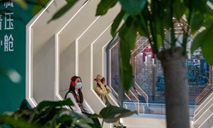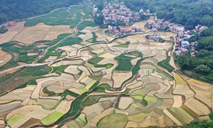Feature: African Americans reflect on disproportionate impact from "surreal" COVID-19 pandemic
WASHINGTON, May 12 (Xinhua) -- Greg Powers had never expected to see a major public health crisis, like the COVID-19 pandemic, in his lifetime. "It's just absolutely mind-boggling," he told Xinhua when describing his feeling of living through it. "It's surreal."
The once-in-a-century pandemic has unimaginably claimed 1 million lives out of more than 82 million infections in the United States over the past two years or so, and changed the nation -- and the rest of the world -- in ways big and small.
For Powers, an African American audio engineer who lives with his family in Arlington County, Virginia, on the East Coast, there has been no shortage of challenges because most of his assignments need to be worked on in studios -- forcing him to travel between home and workplace, which expose him to greater risks of catching the virus.
To protect himself and also those around him, Powers masks up wherever he goes, although most Americans are no longer required to cover their faces indoors in public areas.
Besides, in the first year of the pandemic, Powers wore gloves every single day at work when touching his equipment. He and his wife also chose to go to the pharmacy or grocery store late at night or very early in the morning to avoid contact with the crowd as much as possible.
"I'm not catching COVID though it's still out there," Powers said of his precaution. "I don't really have any physical ailments ... I have loved ones who have it. So it's a situation where I want to be as safe as possible, and I'll keep my family safe."
Powers, who has been fully vaccinated and received a booster shot, said the fact that there has been an obvious hesitancy among the African American community toward the vaccines is partly due to Washington's notorious record of using them to conduct medical experiments.
Powers particularly referred to the infamous "Tuskegee Experiment" that began in 1932, in which hundreds of African Americans were recruited by doctors from the U.S. Public Health Service for a study to track the full progression of syphilis without effective care. In 1997, the White House issued a formal presidential apology for the study which was terminated in the 1970s. "They basically used people as Guinea pigs," Powers deplored. "There's a lot of distrust."
Though Powers said he believes most African Americans "have gotten beyond that" and tried to be vaccinated in this pandemic, he would still feel "relatively safe" if he could see "a whole bunch of different people from different races and cultures" in the line for a vaccination.
The vaccine hesitancy, along with an unequal distribution of healthcare and other resources, has contributed to the pandemic's disproportionate impact on African Americans who are more likely to suffer from preexisting medical conditions like obesity and diabetes, and who work as "essential workers" but are less likely to be insured than white people in the nation.
In Washington, D.C., located just across the Potomac River from Arlington County, African Americans account for roughly half of the population, but nearly four in five COVID-19-related deaths in the U.S. capital. In the first few months of the U.S. vaccine rollout, African Americans received shots at a much lower rate than their white peers.
"Well, racial inequality was baked into the recipe of the creation of the United States of America," Rashawn Ray, a senior fellow at Brookings Institution, wrote in an analysis published in April 2020.
"Inequities in neighborhood resources and the healthcare system are manifestations of this recipe," warned Ray, also an African American. "And, when crises like the COVID-19 pandemic occur, inequalities are exacerbated rather than diminished."
The disparities are even more pronounced in some suburban areas of the country. Bree Hartfield, born and reared in Beaumont, Mississippi, told Xinhua that there is only "a nurse practitioner but no doctor on staff" in the small town where she has seen "a lot of deaths, a lot of tragedies" throughout the pandemic.
"African Americans do succumb to illnesses in a different way because of the lack of resources, the lack of opportunities to get the resources," Hartfield noted, attributing the phenomenon to "inequitable resources" and a lack of good leadership. "So equitable resources are what we would need to implement, especially into the small towns where I think money doesn't reach," she said.
The pandemic has already taken a backseat in the United States to soaring inflation and the Ukraine crisis, as states and cities have lifted anti-pandemic restrictions. But Powers continues to see it as an issue "in the forefront" for him and "a tough situation," because "there are still people who are testing positive."
U.S. President Joe Biden ordered flags at half-staff on Thursday to commemorate the deaths of 1 million Americans who lost their lives to COVID-19.
"Today, we mark a tragic milestone: one million American lives lost to COVID-19," Biden said in a statement. "One million empty chairs around the dinner table. Each an irreplaceable loss. Each leaving behind a family, a community, and a nation forever changed because of this pandemic."
COVID-19 cases and hospitalizations are on the rise in the United States, with new related deaths projected to resurge in coming weeks, according to the Centers for Disease Control and Prevention (CDC). "We are still in the middle of a pandemic, to be sure -- there's no confusion about that," top U.S. infectious disease expert and White House chief medical advisor Anthony Fauci has recently said.
"COVID didn't have to kill most who died from it," former U.S. CDC Director and epidemiologist Tom Frieden tweeted on Thursday. "At least half of U.S. COVID deaths in 2020 were preventable through better public health action, and more than half of 2021 deaths were preventable through improved vaccination. We can save lives by taking reasonable precautions."
Speaking of the nation's loss of more than 1 million lives to the pandemic, Hartfield said it is "an astronomical number" and that "it is terrible."
"I do wish all the blessings for those families," she added. "But I just think this is an opportunity to reflect on the things that we could do better as a country."
Photos
Related Stories
- Study finds glucose-like metabolite effective against COVID-19
- China takes measures to ease companies' challenges amid epidemic
- China to defer social insurance premium payments for epidemic-hit firms
- Beijing to conduct 3 more rounds of mass COVID-19 testing
- Hospital labor expenses surge in U.S. during pandemic
Copyright © 2022 People's Daily Online. All Rights Reserved.










